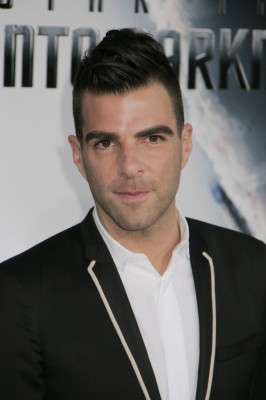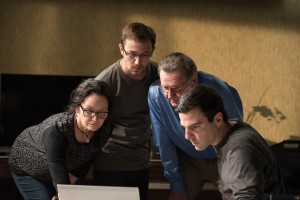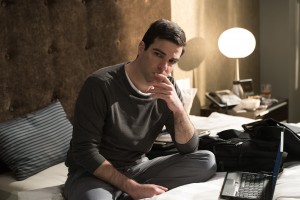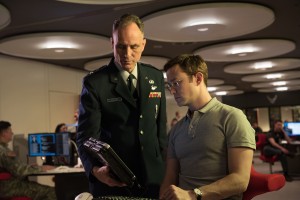By: izumi hasegawa September 14, 2016

Zachary Quinto, the man many know as Spock or Sylar, now has a new alter ego to add to his nameplate, journalist Glenn Greenwald in the new film Snowden. While Quinto’s appearance is limited in the film, the character is significant in the story of Edward Snowden. We chat with Zach about his character, if he met the actual Glenn Greenwald, what his personal reaction was when he heard what Edward Snowden had done, and of course what it was like working with Oliver Stone.
 Q: Let’s start with what it was like playing Glenn Greenwald and how you would describe him.
Q: Let’s start with what it was like playing Glenn Greenwald and how you would describe him.
I think that Glenn is somebody who is fiercely committed to adversarial journalism, obviously, and has a very short fuse and low tolerance for any level of bureaucracy or corporate hierarchy. And I think that combined with the extraordinary circumstances of the situation and the incredibly urgency of the exposure and vulnerability that he and Laura (Poitras) and Ewen (MacAskill) and Ed (Edward Snowden) were all in the midst of in that hotel room in Hong Kong was a kind of perfect storm for an eruption like that. I think we have to be careful not to lay a blanket over who he is or how he operates just based on that one moment. But I do think he’s passionate and incendiary in certain ways and unwilling to back down from his point of view, which is part of what I respect about him. Because all of his positions are supported by his unimpeachable intelligence and information, which he backs up his positions with pretty unilaterally.
 Q: Did you get to meet him?
Q: Did you get to meet him?
I have met him in the past. I actually met him in 2009. We were both guests on the Bill Maher show. He was a panelist. I was a mid-show guest. So we met briefly then. But that obviously was before all of this went down. I didn’t get a chance to meet him in preparation for the film, unfortunately, because of scheduling and traveling and not being able to be in the same place at the same time. But for the way that Greenwald factors into this story, it was really enough for me to pour myself into the many articles that he’s written and interviews that he’s given and debates that he’s engaged in and read his book. These are things that really helped me inform me. And I think if it were a film about him, obviously I would have spent more time with him. But we were here to support Oliver’s vision and help him create this world of Snowden’s story. For that I thought all the source materials and resources that I had access to was more than sufficient.
 Q: Do you remember when the story broke and what your reaction was? Also, how much does all this information that we now know about truly affect our lives in your opinion?
Q: Do you remember when the story broke and what your reaction was? Also, how much does all this information that we now know about truly affect our lives in your opinion?
I had a really pretty, I would say, typical reaction to the news story when it broke, which was, “That is really intense and probably has very little to do with me.” There was a kind of Arian complacency, I would say, that I imagine a lot of Americans had. In this technological age that we live in, I feel like so much of this information is theoretical and abstract. And we don’t really necessarily always comprehend right away how effectively it affects us all. And so, doing the film woke me up to that in a way that I might not have been awaked to had I not done the film. When I really understood the magnitude of what was disclosed and the sweeping scale of this sort of dragnet operation and how it just plowed right through the constitutional right to privacy for 10’s of millions of Americans, it made me wake up and look at my own relationship to technology a little bit differently. So I mean I have tape over the camera on my laptop now. I reset all of my passwords. And there’s no two passwords that are the same for any online service. And I have two-step verification enacted in all of my devices. These are the things that we can do. I think the larger question is: Does that really protect us? Technology is something that is endlessly complex and minute. And I think there are always ways around these firewalls. And, obviously, when you are dealing with the government’s capacity to infiltrate them is a whole another level. There’s this great documentary Alex Gibney made about the new frontier of cyberwarfare and the Stuxnet infiltration the nuclear power plants in Iran. It’s a whole new world out there. I think this movie is a part of that and certainly made me aware of it.
 Q: Share with me what it was like working with Oliver Stone and what you feel sets him apart from other directors?
Q: Share with me what it was like working with Oliver Stone and what you feel sets him apart from other directors?
Oliver is a director who really shaped my early understanding and appreciation for cinema and storytelling. His films were seminal to me in my childhood, really. I think his passion for film and for storytelling is something that makes him…sets him apart from 90% of filmmakers. His intellect…he’s so incredibly intelligent and has such an understanding of politics and culture and societies on so many levels. He’s constantly fueled by that exploration and that curiosity. I mean to be at his stage of life and career and to still be so curious is a pretty remarkable thing, I feel.
Snowden opens nationwide in theaters on September 16th
Interview by Izumi Hasegawa (@HNW_Izumi)
Edited by Jody Taylor (@RealJodyTaylor)
Follow Whats Up Hollywood on Twitter @WhatsUpHWood
